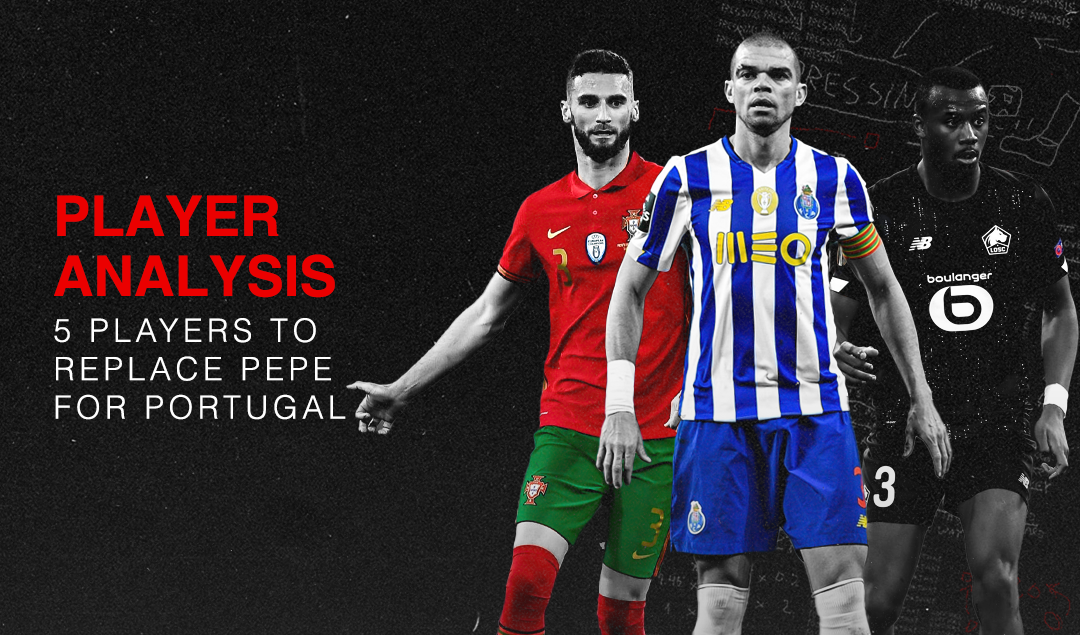Five Players Who Could Replace Pepe for the Portugal National Team
For the past half-decade, Pepe has been a mainstay of the Portuguese national team, having started in each of Portugal’s major tournaments since the 2008 UEFA European Football Championship. Born in Maceió, Alagoas, Pepe moved from his native Brazil at the age of 18, joining Liga NOS side Marítimo in 2001. He would spend the next six years in Portugal, becoming a naturalized citizen in August 2007 and making his debut shortly after in a 0-0 draw to Poland.
Pepe has reached legendary status with the Seleção, having played a leading role in their Euro 2016 triumph in France, and against Juventus, he gave a stellar display to lead Porto through to the UEFA Champions League quarterfinals, proving that he still has plenty left in the tank. However, at 38 years of age, it’s unlikely that he’ll be playing with Portugal after next year’s FIFA World Cup, while his long-time partner José Fonte turns 38 in December.
Pepe delivered a world-class performance against Juventus last week, leading Porto to the Champions League quarterfinals and proving why, even at 38, he is a crucial part of Portugal’s team.
We discussed Pepe’s greatness on the latest Cortalinhas episode: https://t.co/yjjowa6CxT pic.twitter.com/NFh6rsJkdL
— Breaking The Lines (@BTLvid) March 15, 2021
Indeed, Pepe was forced to withdraw from Portugal’s World Cup qualifying matches against Azerbaijan, Serbia and Luxembourg after suffering a muscle injury in his right leg in Porto’s 2-1 victory against Portimonense, with manager Fernando Santos electing to replace him with Sporting’s 32-year-old defender Luís Neto, who has struggled for game-time under Rúben Amorim this season.
Whilst Rúben Dias is a guaranteed starter for both Portugal’s short-term and long-term at 23 years of age, having solidified Manchester City’s once-leaky defense and forming a stalwart pairing alongside John Stones, it remains to be seen who will emerge from the bunch to become Dias’ partner in Portugal’s defense. Here are five players who could become the long-term successor to Pepe’s throne.
Rúben Semedo
Born in the Amadora neighborhood of Lisbon — the most densely populated municipality in Portugal — to Cape Verdean parents, Semedo joined Sporting’s academy at 16 years of age, working his way through the academy before joining Spanish side Reus on loan for the 2014/15 season. The following season, he made his competitive debut for Sporting, before joining Vitória de Setúbal on loan, but he was called back from his loan midway through the season after Tobias Figueiredo’s injury.
Upon his return to the Estádio José Alvalade, Semedo became one of the first names on Jorge Jesus’ team sheet, starting in central defense as Sporting narrowly lost the league title to Benfica. He continued his impressive form the following season, earning himself a €14 million move to Villarreal on June 7, 2017. Semedo started two matches under manager Fran Escribá — a 0-3 defeat to Real Sociedad and a 0-4 defeat to Getafe — but he would only make one appearance under manager Javier Calleja due to a spell of injuries.
His fortunes would worsen on February 20, 2018, when he was arrested for kidnapping a man and bringing him back to his apartment, before beating him with baseball bats and threatening to cut his finger off. Alongside his cousin and friend, he tied up the victim, went to his apartment, and stole €24,000 in cash, watches, a computer and other items. Semedo and his entourage were reportedly trying to reclaim money that had been loaned to the man.
This was his second legal incident in Spain after brandishing a weapon and threatening someone while nursing an injury. For the kidnapping incident, Semedo spent five months in prison before being released on July 13 after paying a bail of €30,000. It was a similar fate to his father, who was jailed when Semedo was five years old, forcing Semedo to grow up on the streets as his mother worked from dawn to dusk.
“I cried many times. I never cried in front of anyone, but many times I lied down, I couldn’t sleep, I could only think about my children and my family’s suffering,” said Semedo in an interview with A Bola. “It makes you think if it’s really worth giving up time to spend with your family to spend time with people who don’t have your best interest at heart and follow paths that aren’t going to get you anywhere.”
From then on, Semedo was sent out on loan to Huesca and Rio Ave, before joining Olympiacos on July 25, 2019, on a four-year contract for a fee of €4.5 million. Playing under Portuguese manager Pedro Martins, Semedo has impressed both in Greece as well as in European competition, earning a maiden call-up to the Portuguese national team in October 2019. A year later, he made his full debut, playing the full 90 minutes in a stalemate against Spain.
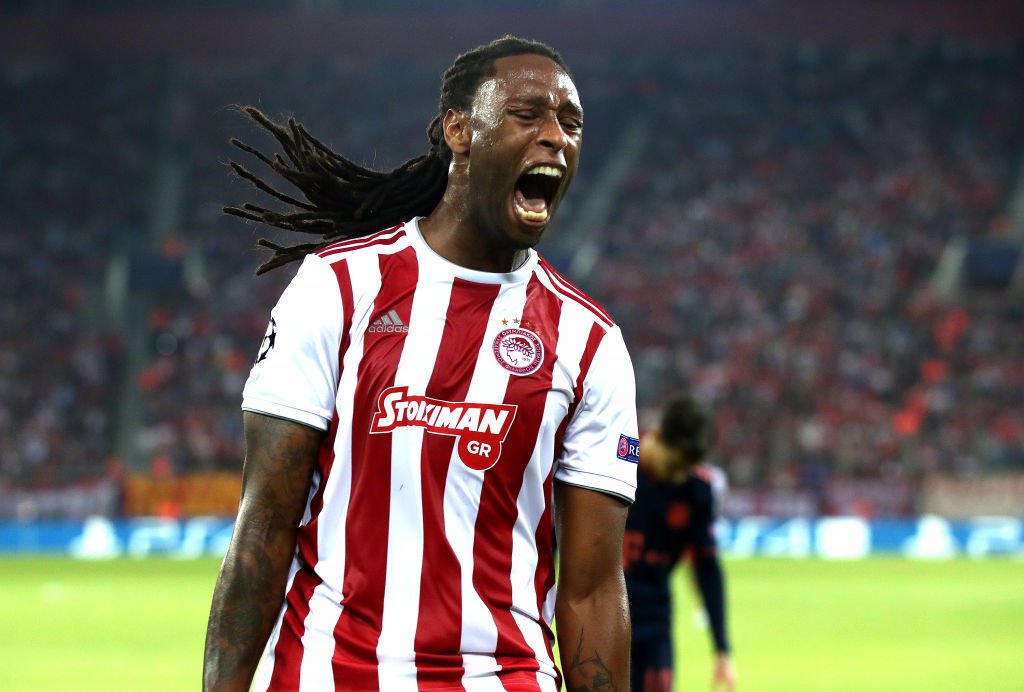
Photo: Alexander Hassenstein – Bongarts/ Getty Images
The 26-year-old is capable of winning the ball back in one on one situations, using his 6’2″ frame to ease players off the ball or win an aerial duel. He is also competent with the ball at his feet, not being afraid to carry the ball out and play shorter passes to his teammates, however, his long-range passing is lacking. With regards to the timing of his tackles, what can often be noticed is that he can sometimes be a bit rash in the challenge and go in either too quickly, indicating a lack of patience, or too strongly, and thus giving away a foul.
On the whole, he is the most experienced in both club and international football who could fill out the role Pepe has had over the years. Like Danilo Pereira, he is capable of filling in as a center back as well as a defensive midfielder, and like Pepe, he is an aggressive, physically imposing defender who isn’t afraid to step on toes to win the ball. They have a somewhat similar playstyle, and similar weaknesses, and so Santos would likely not have to change his system or dynamics significantly in order to use Semedo next to Dias in the team.
Diogo Leite
Pepe is still captaining Porto and delivering elite performances at 38 years of age alongside Chancel Mbemba in the heart of Sérgio Conceição’s defense, but having suffered several injuries since his return to the Estádio do Dragão, it’s clear he can’t be relied upon to remain fit for every single game. One player who is capable of filling his void for club and country is Diogo Leite.
Born in Porto, Leite joined the club’s youth academy at 9 years of age, progressing through the ranks for club and country and marking his claim as one of the most promising center backs in Iberia. Alongside the likes of Gedson Fernandes, Diogo Dalot, and Domingos Quina, Leite won the 2016 UEFA European Under-17 Championship in Azerbaijan. The lone goal that they conceded during the entire tournament came in the Final against Spain, but the Esperanças would go on to win on penalties.
Leite made his Primeira Liga debut for Porto on August 11, 2018, playing the full 90 minutes alongside Felipe Monteiro in a 5-0 victory over Chaves, and the following weekend, he scored in a 3-2 victory over Belenenses SAD. However, after struggling in a 2-3 defeat to Vitória de Guimarães, he dropped back to the reserve side for the rest of the season, only playing for the first team in a 1-1 draw against Chaves in the Taça da Liga and a 3-2 victory over Galatasaray in the final Champions League group stage match.
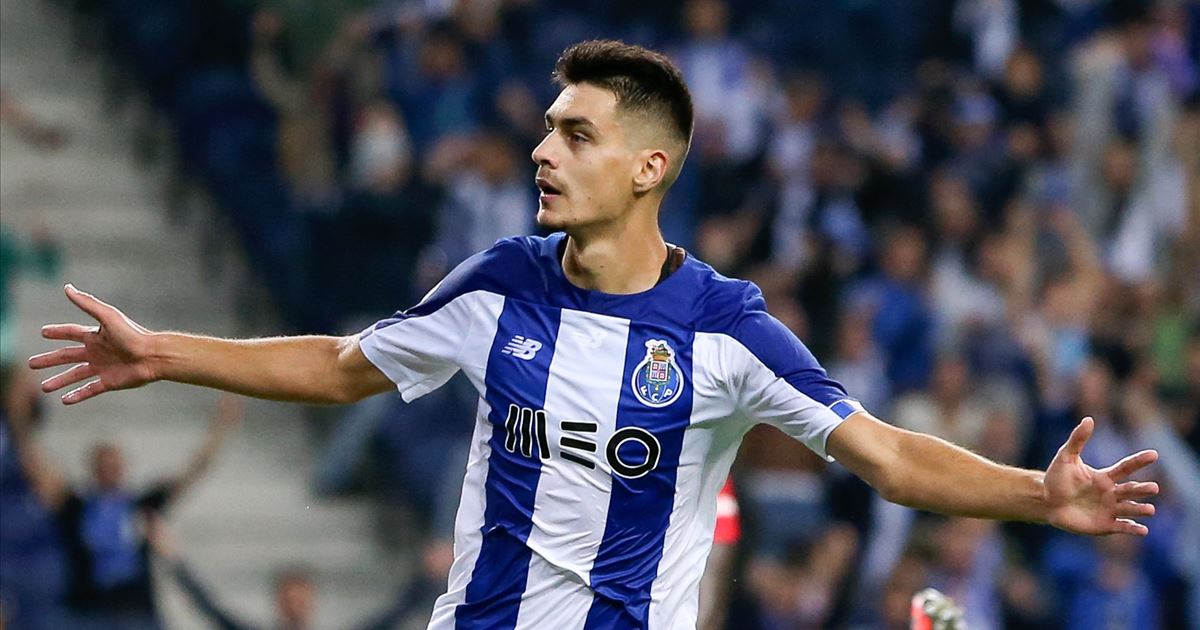
Photo: José Coelho / Lusa
The defender would go on to play an important role in defense as Porto defeated Tottenham, FC Midtjylland and Hoffenheim, keeping clean sheets in the process, before beating Chelsea 3-1 in the UEFA Youth League Final in Nyon, Switzerland. However, his fortunes did not improve much under Conceição, starting in various domestic cup matches, but only playing seven minutes in the league and Europa League by the dawn of the new decade.
The 22-year-old defender has gradually become an important part of Porto’s defense following Iván Marcano’s ACL injury, and while he is still behind Pepe, Mbemba, and Chelsea loanee Malang Sarr in the pecking order, he has logged valuable minutes both at center back and left back, and will likely play a huge role for Portugal as they compete for glory in the U-21 Euros.
Being left-footed, he provides something different in possession to others on this list, in that he can spray passes from different angles for Portugal quicker wingers such as Jota to latch onto. At youth level, he has been likened to Aymeric Laporte in his more conservative nature of defending, and his excellent ability to play passes of any length across the field. If Leite can push on and lock down a starting spot at Porto, he could become the long-term partner for Rúben Dias at the national team.
Diogo Queirós
Alongside Leite in defense, Diego Queirós has formed a solid center back pairing over the years for Portugal’s youth teams, having captained the side to victory in the 2016 U-17 Euros and won the 2018 U-19 Euros as well. As well as João Félix, Florentino Luís and Diogo Dalot, he is another member of Portugal’s famed class of 1999, and his performances in defense have seen Portugal win their first two group stage matches whilst conceding zero goals.
Having arrived from Leixões S.C. at the age of 11, Queirós formed an imposing duo in defense alongside Leite for Porto’s youth teams, but he never managed to make his first-team debut under Sérgio Conceição. Instead, he joined Royal Excel Mouscron on loan following his UEFA Youth League triumph, where he would make 21 appearances before the suspension of the season due to the COVID-19 pandemic.
Following his loan spell in Belgium, Queirós joined Famalicão on a three-year-contract, with Porto letting him leave on a free transfer while keeping 50% of his economic rights. Whilst Famalicão came within seconds of qualifying for the Europa League in their first season back in the top flight since 1993/94, the story has been far different this season without the likes of Fábio Martins, Pote, and Toni Martínez.
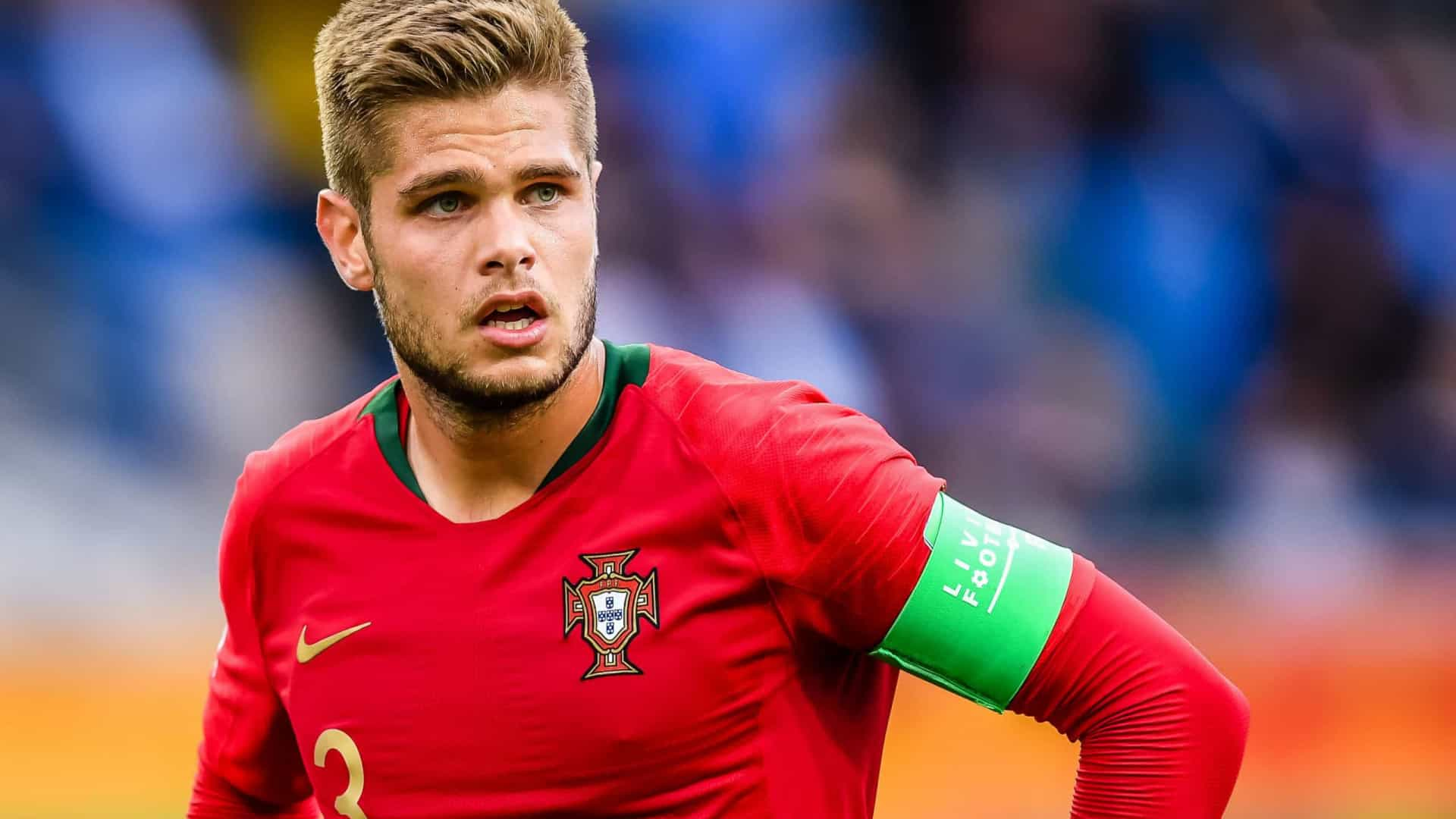
Photo: Getty Images
Famalicão have been caught up in a relegation fight this season, resulting in the sackings of managers João Pedro Sousa and Silas. However, they are currently 14th in the league and two points above the drop after an impressive start to life under new manager Ivo Vieira, which saw them take a 2-2 draw against Braga and defeat relegation rivals Marítimo 4-0 away at the Estádio dos Barreiros.
The only issue? Whilst Queirós has been a guaranteed starter under Sousa and Silas, he has dropped to the bench for Vieira’s first two matches with Brazilian defender Riccieli being preferred alongside Red Star Belgrade loanee Srđan Babić in the heart of Famalicão’s back four. Nevertheless, Queirós will get his chance to prove why he should be a starter sooner rather than later, and his performances for the Esperanças certainly won’t have hurt his case.
Like Leite and Dias, he is a great passer at all ranges and has demonstrated in his playing time so far in his career, that he is capable of playing on the left, right, and in the middle of either a duo or trio or center backs, which could prove handy for Santos if/when he decides to promote him in the future.
Something that he has over Leite is that he is more dominant aerially, particularly in the opposition box, proven by him scoring consistently from corners, providing Fernando Santos with another target in the box on corners to score from. He is also fairly athletic, meaning he can play in a higher line and sprint back when required to, but also deal with balls behind him, and at an awkward height, to a greater extent than Semedo can.
When defending, he can often get caught square on to the attacker, which is a poor body position and can often lead to being dribbled past, indicating he needs to work on his body positioning in one on one scenarios specifically. Whilst Queirós can sometimes suffer from lapses in concentration, he is another highly capable player, who, along with Leite, presents a very good option for Santos or any future Portugal manager, in the future.
Domingos Duarte
While he hasn’t yet won any silverware at the international level, Domingos Duarte has something that Leite and Queirós don’t: a senior cap. The 26-year-old made his Seleção debut on November 11, 2020, in a 7-0 drubbing over Andorra, and on March 24, he played the full 90 minutes in a 1-0 win over Azerbaijan in a 2022 FIFA World Cup qualifying match. It seems all but certain that he will be Santos’ fourth-choice center back this summer alongside Dias, Pepe and Fonte.

Photo: DR
Born in Cascais, Duarte began his development at Estoril before joining Sporting’s academy in 2011 at the age of 16. Unlike Semedo, he would never register a senior appearance for the Leões, and after biding his time in the reserves, Duarte spent back-to-back loan spells at Belenenses SAD and Chaves. Despite impressing in defense for both Primeira sides, Sporting elected to loan him out to Deportivo de la Coruña with an option to buy.
Duarte locked down a starting spot under José Luis Martí as the Galician side finished sixth in the Segunda, earning a place in the promotion play-offs. They looked set to return to the top flight after thrashing Málaga in the semi-finals and beating Mallorca 2-0 in the first leg; however, Los Bermellones would go on to win 3-0 in the following match to seal promotion, and the following year, Deportivo were relegated to Spain’s third division for the first time in 39 years.
The Portuguese defender would not remain in the Segunda, however; he joined newly promoted Granada on a four-year deal, with Sporting receiving €3 million and maintaining a 25% resale clause. He has become a pillar in defense for Diego Martínez’s side, who currently sit 8th in the league and are through to the UEFA Europa League quarterfinals, where they will face off against Manchester United.
On the face of things, Duarte does not look like a player who will be the starting center back for Portugal for the next decade. He seems quite sluggish, and uncomfortable on the ball. Since the start of the 2018/19 season, Duarte ranks in the bottom 26% or worse vs other top 5 league center backs on a per 90 basis in: passes into the final third, yards progressed, pass completion rate, long pass competition rate, successful pressures, interceptions, and tackles.
He does have some strengths though: he is fairly competent in the air and usually does not lunge into challenges, thus conceding fewer fouls. Altogether, this paints quite the picture of a defender who seems to be below average on the whole, and thus, for now, whilst he may act as a filler until the younger center backs come through, and in the long term, unless he significantly improves, will unlikely have a permanent space in the Portugal squad.
Tiago Djaló
Leite and Queirós continue to be undisputed starters in the heart of the Esperanças’ defense under Rui Jorge, but sitting behind them is Tiago Djaló. Born in Amadora to Bissau-Guinean parents, Djaló bounced around several smaller clubs before joining Sporting’s academy in 2013. He progressed through the ranks for club and country, but like Duarte, he never made a senior appearance for the first team.
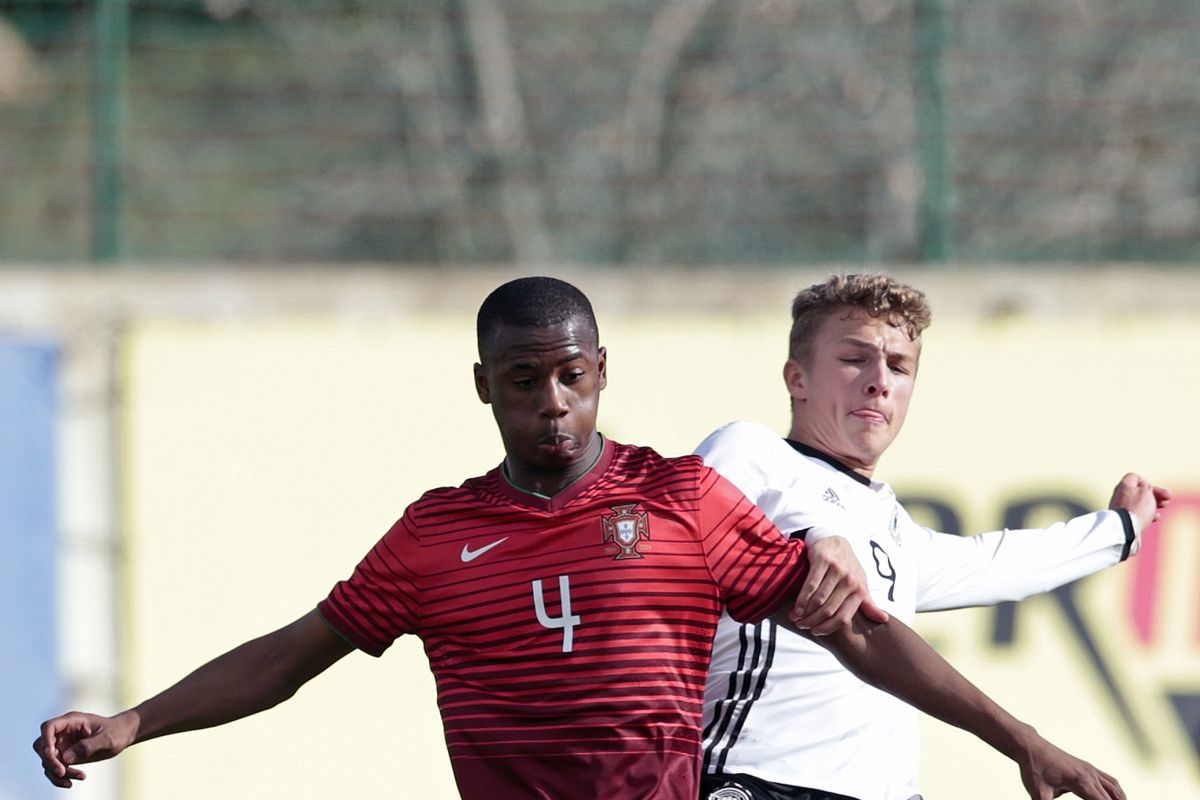
Photo: Ricardo Nascimento/Getty Images
Due to a contract dispute, Djaló found himself frozen out of Sporting’s B team and in the midst of transfer speculation between the likes of West Ham, Lazio and Manchester City, but it was Milan who won the race for him, paying €500,000 for the defender in January 2019. Djaló would only make one appearance for Milan, however, coming on as a substitute in a preseason friendly against Novara.
Two weeks later, Djaló joined Lille on a five-year contract, with Milan using him as a makeweight to complete a separate deal for ex-Sporting player Rafael Leão. Djaló began the season on the right foot, starting alongside Fonte in their season opener as Lille defeated Nantes 2-1. He kept his place in defense in the following three Ligue 1 matches but was hauled off midway through a 0-2 defeat to Reims on September 1.
Although he gained valuable minutes under Christophe Galtier as a rotational piece, he lagged behind Fonte and Gabriel Magalhães in the manager’s pecking order in his first season in France. Following Gabriel’s departure to Arsenal, Sven Botman has been a revelation alongside Fonte in defense, although Djaló has still been an effective backup this season, playing 1,225 minutes both at right back as well as a center back.
On the pitch, he looks quite mature for his age in timing his tackles, and knowing when to just jockey and maneuver his man out of a dangerous area. Crucially, and what I like most about him, is that he looks very comfortable on the ball, and highly capable at playing line-breaking passes.
Whilst he still does need to improve, specifically in his aerial ability which has been noticeably weak and sometimes leads to goals against Lille, and despite him not starting for the Portugal U-21 side as much as of late, he looks like the one who could make the jump up, if he can start getting some more game time at Lille and Portugal this season.
Conclusion
Apart from the five aforementioned players, there is a litany of promising young Portuguese center backs who could play important roles for the Seleção in the coming years. Gonçalo Inácio has been vital in Sporting’s title charge under Rúben Amorim, whilst Jorge Fernandes, Fábio Cardoso and Tomás Ribeiro have impressed at midtable clubs this season. Although Ferro and Eduardo Quaresma have struggled for minutes this season, they too could turn their fortunes around and stake a claim for a roster spot.
One player who could be a wild-card option for Fernando Santos is Ezri Konsa. The 23-year-old has spent his entire life in England and was part of the team that won the 2017 U-20 World Cup in South Korea, and he is eligible to play for Angola, DR Congo, and Portugal. Despite impressing for Aston Villa this season, his form has been ignored by England manager Gareth Southgate, and the promise of forming a rock-solid duo alongside Dias could tempt him to switch over to the Seleção.
Even at 38 years of age, Pepe continues to be a dominant force in the heart of defense for club and country, and if healthy, he will no doubt start in this summer’s Euros next to Dias and potentially even the 2022 FIFA World Cup in Qatar. Replacing his impact as a defender is easier said than done as it is; replacing his presence as a leader both on the pitch and in the dressing room is downright impossible.
By: @DBAFootball
Featured Image: @GabFoligno / Octavio Passos / Getty Images / Dean Mouhtaropoulos / Getty Images / Nicolò Campo / Light Rocket
